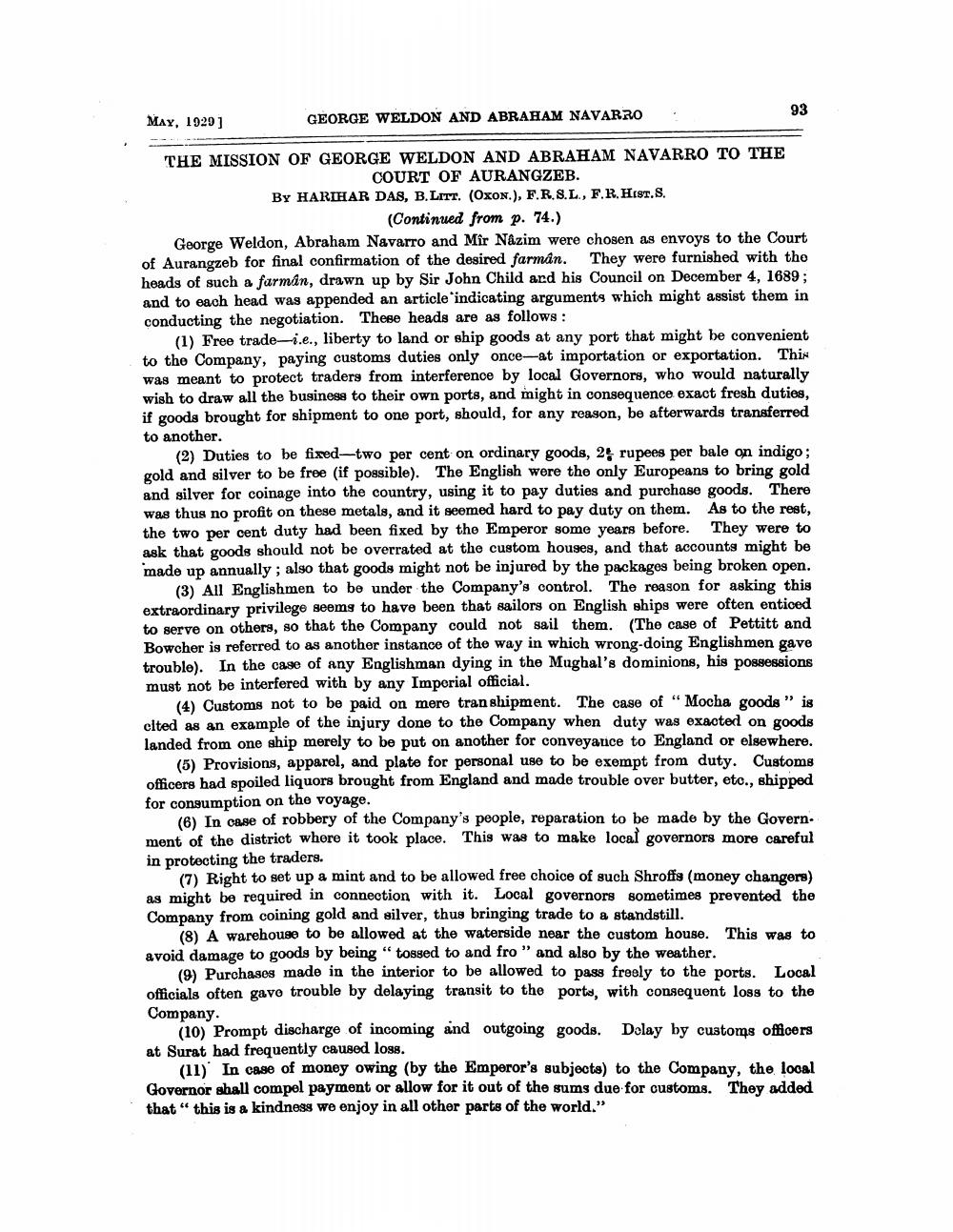________________
MAY, 1929]
GEORGE WELDON AND ABRAHAM NAVARRO
93
THE MISSION OF GEORGE WELDON AND ABRAHAM NAVARRO TO THE COURT OF AURANGZEB. BY HARIHAR DAS, B. LITT. (OxON.), F.R.S.L., F.R. HIST.S. (Continued from p. 74.)
George Weldon, Abraham Navarro and Mîr Nâzim were chosen as envoys to the Court of Aurangzeb for final confirmation of the desired farman. They were furnished with the heads of such a farmân, drawn up by Sir John Child and his Council on December 4, 1689; and to each head was appended an article indicating arguments which might assist them in conducting the negotiation. These heads are as follows:
(1) Free trade-i.e., liberty to land or ship goods at any port that might be convenient to the Company, paying customs duties only once-at importation or exportation. This was meant to protect traders from interference by local Governors, who would naturally wish to draw all the business to their own ports, and might in consequence exact fresh duties, if goods brought for shipment to one port, should, for any reason, be afterwards transferred to another.
(2) Duties to be fixed-two per cent on ordinary goods, 2 rupees per bale on indigo; gold and silver to be free (if possible). The English were the only Europeans to bring gold and silver for coinage into the country, using it to pay duties and purchase goods. There was thus no profit on these metals, and it seemed hard to pay duty on them. As to the rest, the two per cent duty had been fixed by the Emperor some years before. They were to ask that goods should not be overrated at the custom houses, and that accounts might be made up annually; also that goods might not be injured by the packages being broken open.
(3) All Englishmen to be under the Company's control. The reason for asking this extraordinary privilege seems to have been that sailors on English ships were often enticed to serve on others, so that the Company could not sail them. (The case of Pettitt and Bowcher is referred to as another instance of the way in which wrong-doing Englishmen gave trouble). In the case of any Englishman dying in the Mughal's dominions, his possessions must not be interfered with by any Imperial official..
(4) Customs not to be paid on mere tran shipment. The case of "Mocha goods" is cited as an example of the injury done to the Company when duty was exacted on goods landed from one ship merely to be put on another for conveyance to England or elsewhere.
(5) Provisions, apparel, and plate for personal use to be exempt from duty. Customs officers had spoiled liquors brought from England and made trouble over butter, etc., shipped for consumption on the voyage.
(6) In case of robbery of the Company's people, reparation to be made by the Govern ment of the district where it took place. This was to make local governors more careful in protecting the traders.
(7) Right to set up a mint and to be allowed free choice of such Shroffs (money changers) as might be required in connection with it. Local governors sometimes prevented the Company from coining gold and silver, thus bringing trade to a standstill.
(8) A warehouse to be allowed at the waterside near the custom house. This was to avoid damage to goods by being "tossed to and fro " and also by the weather.
(9) Purchases made in the interior to be allowed to pass freely to the ports. Local officials often gave trouble by delaying transit to the ports, with consequent loss to the Company.
(10) Prompt discharge of incoming and outgoing goods. Delay by customs officers at Surat had frequently caused loss.
(11) In case of money owing (by the Emperor's subjects) to the Company, the local Governor shall compel payment or allow for it out of the sums due for customs. They added that "this is a kindness we enjoy in all other parts of the world."




